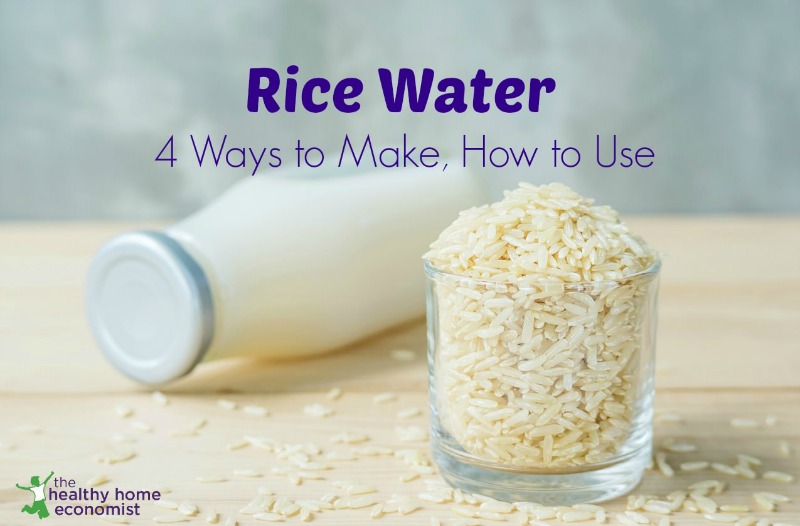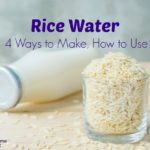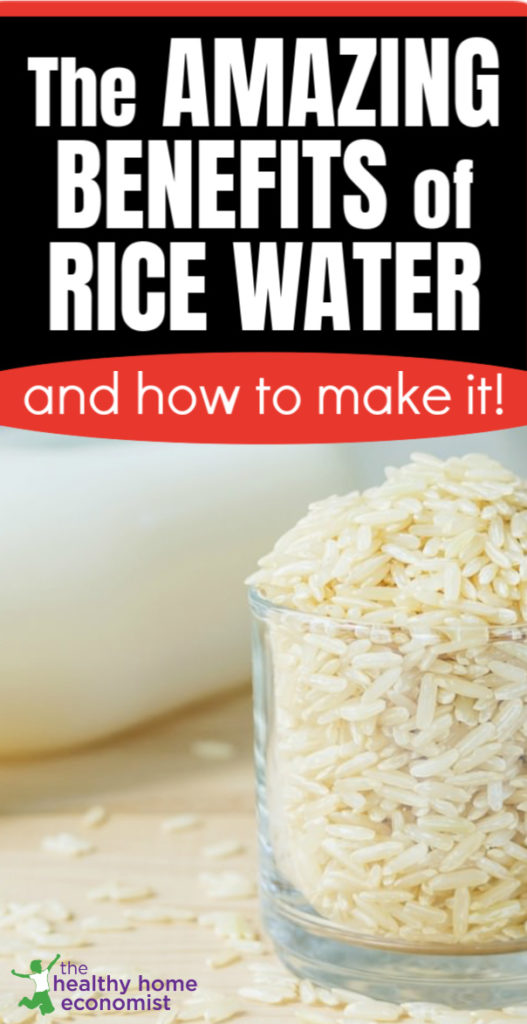
My first experience with traditional diet occurred in the early 1990s when my primary care MD at the time introduced me to Ayurvedic cooking. She also utilized a number of Indian remedies in her practice of which rice water was one of the simplest.
Traditionally made rice water has 3 main uses in the home. Benefits range from non-toxic beauty care for both hair and skin, a healthful non-dairy beverage, and an effective home remedy for diarrhea from gastroenteritis – even cholera. On cruise ships, staff sometimes recommend eating mushy white rice with the cooking water to passengers when norovirus outbreaks occur. It helps to resolve symptoms and soothe the digestive tract.
How to Make Rice Water
Rice water is quite simple to make. Choose one of four methods depending on your intended use. The rice water recipe below outlines each option.
The included video demonstrates the first method…how to make rice water as a hair treatment.

Rice Water Recipe (4 methods)
The four different methods for making traditional rice water for beauty, beverage, or home remedy purposes.
Ingredients
- 1 cup uncooked rice preferably organic
- filtered water
Instructions
-
METHOD 1: Thoroughly rinse the uncooked rice and then soak in water for about 30 minutes. Drain the water and use. This rice water method is recommended for external use only.
-
METHOD 2: Rinse the rice thoroughly and then boil for about 15 minutes. Use twice the amount of cooking water as usual. Drain the excess cooking water, cool to room temperature and dilute until it is slightly cloudy. Use this method when a home remedy for gastroenteritis is needed immediately.
-
METHOD 3: Rinse rice thoroughly and soak 8 hours or overnight in a pot with 6 parts water to one part rice. Drain, rinse again, and then simmer the rice in 8 parts water to one part rice until the rice is very, very soft or even dissolves. Any remaining rice is then blended into the cooking water. This method is ideal for making rice water as a beverage.
-
METHOD 4: Culture the rice water post cooking via method 3 above into fermented rice milk. See links to recipes below.
Recipe Video
How to Use Rice Water
Wondering which of the four methods outlined in the recipe above to use? Here are some guidelines.
For Beauty …
Methods 1 and 2 are best when using the rice water for external use such as skin toning or as a natural hair rinse. (1)
Which method you choose for beauty care is entirely based on personal preference. However, note that adding salt to the rice water is not recommended as this will have an undesirable drying effect on hair or skin.
I have found no scientific research to support the benefits of using rice water externally. On the other hand, anecdotal evidence abounds! That said, it is certainly a nontoxic choice, so if you enjoy using it, then it is safe to continue. It is certainly friendly on the budget.
As a Beverage …
Method 4 is optimal when the rice water will be used as a non-dairy beverage. If this method is chosen, the rice water is much thicker and is often referred to as “rice milk”. This recipe for wild rice milk and this one for brown rice milk transform the thickened rice water into a pleasant tasting drink.
As a Home Remedy…
If using “water of rice” for gastroenteritis, food poisoning, or diarrhea, use methods 2 or 3. Use method 2 only in a pinch when you need the rice water immediately. Method 3 is optimal and will produce the best and safest results.
Several glasses sipped throughout the day are suggested. This traditional remedy called tandulodaka is especially helpful for young children according to Ayurvedic medicine. (2) It is also useful when traveling and bone broth is not available. The cooked rice starch in the water accomplishes a similar effect to gelatin in the digestive tract although with less nutritional benefits.
No matter which method you choose to make rice water, it will last in the refrigerator for about a week. You can also freeze it for later use if desired.
Types of Rice to Use
Brown, white, red, black or wild rice may be used for homemade rice water. Wild rice is significantly more nutritious than either white or brown rice.
Ayurveda teaches that water from red rice is especially beneficial.
As a home remedy, white rice is ideal as the fiber has been removed leaving mostly starch. The starch suspended in the water is what makes rice water so effective for stopping diarrhea.
Sprouted Rice Water?
Germinated rice is certainly an option for making rice water. However, since sprouting uses up a portion of the starch, it is best to use only for non-dairy beverage or beauty purposes. Why is this? Sprouted brown rice contains more B vitamins and vitamin C than unsprouted rice. (3)
Hence, if you are going to use it for skin and hair, using sprouted rice water would make sense. However, if if you are going to use it to resolve a tummy bug, it is not advisable as rice starch is a crucial aspect of this remedy.
Note that if you choose to use sprouted rice to add additional vitamins to the water, you still must rinse and soak. The importance of these steps is discussed further below.
The BEST Rice Water
It concerns me greatly that many sites suggest only a brief soak when making rice water. I’ve also seen a few recipes where rinsing isn’t even recommended.
Astounding!
This is hugely problematic as both a thorough rinsing and an overnight soak is optimal for making the best rice water.
Why Rinse Rice?
You must ALWAYS rinse rice before using it. Rinsing several times is even better. No exceptions even if buying organic.
This is especially important if you are like most people and choose to use white rice to make rice water. Same protocol for organic white rice.
This is because white rice or any partially polished rice may contain large amounts of residual talc. The risks from talc are somewhat debated, but it is known to possibly contain asbestos. There are currently no standards that give comfort that talcs used in rice polishing meet some sort of independent, rigorous standard or testing to be asbestos-free. Incidentally, talc exposure is linked to ovarian cancer. (4)
Check out this video which shows the process of polishing white rice using talc. Notice the size of the bag of talc that mixes with the brown rice!

Why Soak Rice?
I have yet to see a single rice water recipe that suggests an overnight soak for the rice before cooking. This is very concerning given the very solid evidence that rice is widely contaminated with arsenic.
Organic rice poses the same risks! Note that organic powdered baby formulas that contain rice syrup as the number one or number two ingredient are documented to be an arsenic risk for babies.
If a serving of heavy metals with your Ayurvedic tummy bug remedy or dairy-free beverage isn’t appealing, take heart. A simple overnight soak reduces toxins in the rice by up to 80% according to research. (5)
Note that my suggestion to soak the water overnight in 6 parts water to one part rice is based on the results of this research. Other rice water recipes do not suggest soaking with this much water, nor do they suggest soaking for any longer than about 30 minutes.
As a bonus, anti-nutrients like phytic acid and lectins in rice, particularly brown rice varieties, are reduced by extended soaking as well. (6)
If using the water from cooked rice only externally, the recommendation to thoroughly rinse, soak, rinse again, and then cook is not as critical. If consuming, however, it is best to heed wise traditional preparation methods to ensure the safest and most effective rice water.
References
(1) How to Use Rice Water For Gorgeous Hair And Flawless Skin
(2) Tandulodaka Ayurvedic Preparation Method and Uses
(3) Sprouted Brown Rice
(4) Asbestos in commercial cosmetic talcum powder as a cause of mesothelioma in women
(5) Cooking Rice Incorrectly Could Endanger Health
(6) The Lectin Report








Thank you for sharing it. Additionally in Ayurveda Gynecology rice water is used in recurrent urinary tract infection.
How long can i keep the after removing the rice
am using it and is very good on my skin. I don’t have smooth skin before but since I started using per boiled rice water am OK now.thanks to my lovely friend dat introduce it to me.
Thanks very much. I love natural methods like this. Will try it. But do u have to rinse your face or body after using rice water or u just apply your body cream?
Is Jasmine rice ok to make rice water with?
Yes, jasmine white rice is wonderful for making rice water.
Can long grain brown rice be used?
White rice only for these recipes. The hull on brown rice hinders the starch portion of the rice from fully contacting the water.
Can you use bottle purified water to make rice water for hair? Can I use rice water once a week and formented rice water once a week?
Rice water is extremely safe for hair, so use it at whatever interval produces the best results for you.
Sarah, your last statement says that if using only for external purposes ( I assume for face and hair), the soaking overnight is not necessary, but the arsenic, then, would still be present, correct? Is it not a concern putting arsenic on your skin? If I were to soak rice over night before making the tonic for skin, would the soak, indeed, remove the beneficial nutrients I want to use for my skin? A little confused on that point…..
Yes of course putting arsenic on the skin is problematic, but not as much as eating it. Also, the amounts of arsenic are miniscule and you need to be eating rice as a staple unsoaked several times a week for it to be a problem.
It is far less of a concern to soak rice when making rice water if it is just for external purposes. If you have heavy metal issues already, then go ahead and soak if this makes you more comfortable.
Is it okay I use rice water as live in conditioner or as in refresh my curls
I haven’t tried it for that purpose, but my concern is that it might smell a bit.
Is it necessary to dilute boil rice water with plain water before using it on face and would it give the same good results.